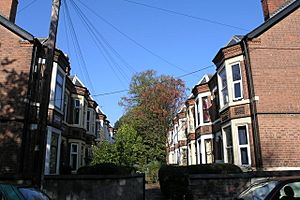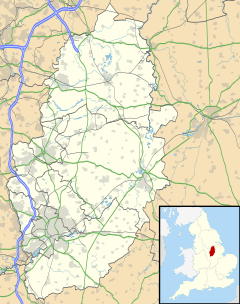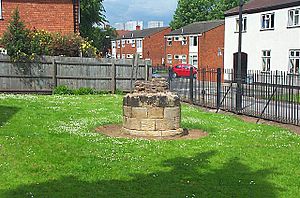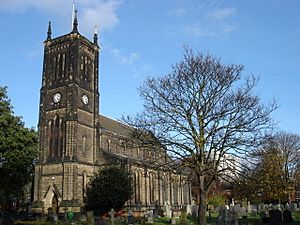Lenton, Nottingham facts for kids
Quick facts for kids Lenton |
|
|---|---|
 |
|
| OS grid reference | SK 55425 39422 |
| District | |
| Shire county | |
| Region | |
| Country | England |
| Sovereign state | United Kingdom |
| Post town | NOTTINGHAM |
| Postcode district | NG7 |
| Dialling code | 0115 |
| Police | Nottinghamshire |
| Fire | Nottinghamshire |
| Ambulance | East Midlands |
| EU Parliament | East Midlands |
| UK Parliament |
|
Lenton is a lively area in the city of Nottingham, England. It's mostly found within the 'Dunkirk and Lenton' part of the city.
Lenton used to be a small farming village. It became part of Nottingham in 1877 when the city grew bigger. Nottingham officially became a city in 1897 during Queen Victoria's special celebration, her Diamond Jubilee.
Contents
Discovering Lenton's Past
The name Lenton comes from the River Leen, which flows nearby.
Lenton and its mills (factories that use water power) were even mentioned in the Domesday Book. This was a huge survey of England made almost 1,000 years ago in the late 11th century. It said: "In Lentune 4 sochmen and 4 bordars have two ploughs and a mill."
The Story of Lenton Priory
Lenton Priory was a special monastery built in the village by William Peverel around the early 1100s. It was a Cluniac monastery, which meant it followed rules from a French monastery called Cluny Abbey. For a long time, most of the monks here were French.
Later, in the 13th century, the priory faced money problems. It was known for being "poor and in debt." The priory was eventually closed down in 1538. This happened as part of King Henry VIII's big plan to close many monasteries across England.
After the priory was closed, its buildings were taken down. Its lands were then sold to private owners. Today, the Priory Church of St. Anthony is thought to have parts of the old priory's hospital chapel.
In 2005, Lenton celebrated a big birthday for the Priory. It was 900 years since it was founded! A special festival was held at the Priory Church of St. Anthony to mark the occasion.
The Famous Lenton Fair
King Henry II gave the priory permission to hold a yearly fair. This fair happened on St. Martin's Day, November 11th. The Lenton Fair first lasted for 8 days, then grew to 12 days.
This fair often caused arguments with the leaders of Nottingham town. This was because no markets could be held in Nottingham while the Lenton Fair was on. However, people from Nottingham got special deals to rent stalls at the fair.
The fair continued even after the Priory closed. Over time, it became shorter. By 1584, it was mainly known as a horse fair. Even servants of Mary, Queen of Scots came to it! By the 17th century, it was famous for all kinds of horses. In the 1800s, farmers and horse dealers used it a lot. The Lenton Fair finally stopped in the early 1900s.
Lenton's Growth: 16th to 20th Centuries
From the priory's closure in 1538 until the late 1700s, Lenton was mostly a quiet farming village.
In the 1790s, the Nottingham Canal was built right through the village. This brought big changes! Factories started to appear, and more people moved to Lenton. The population grew from 893 people in 1801 to 3,077 in 1831.
A new area called New Lenton was built on farmland. It helped make space for more homes and factories. Many people in Lenton, like in other nearby villages, worked in making and selling lace.
Lenton became part of Nottingham in 1877. This happened when Nottingham's city limits were made larger. Nottingham officially became a city in 1897.
Today, both the University of Nottingham and the Queen's Medical Centre are in Lenton. This means many students live here, making it a very student-friendly area.
Lenton's Location
Lenton is part of the Nottingham South area for government purposes. Most of Lenton is in the 'Dunkirk and Lenton' voting area. The "Lenton Triangle" area is also seen as part of Lenton by many locals.
Lenton is mostly a place where people live. It is very popular with students from the nearby University of Nottingham. These students often choose to live off-campus here. Because so many students live in Lenton, some local residents have campaigned. They feel the area is becoming too focused on students.
Nearby Areas
Important Buildings in Lenton
Marcus Garvey Ballroom
The Marcus Garvey Ballroom is a community center for the local West Indian community. It is managed by West Indian Cavaliers and is on Lenton Boulevard. It is named after Marcus Mosiah Garvey.
This place is famous for its large music hall, the Ballroom, which can hold about 1,000 people. It hosts many events, including student club nights and live music. It also has the well-known C.P.H sound system.
The Marcus Garvey Day Care Centre also offers day care for older African Caribbean people. They have many activities like bingo, raffles, needlework, dominoes, and arts and crafts. A prayer meeting is held on Friday mornings. Fresh meals are available for a small fee. The center has a library, an organ, music, TV, and video. The building is also easy for wheelchairs to access.
This building used to be part of the Raleigh bicycle company. Raleigh had a large factory in Lenton. For much of the 20th century, it was the biggest bicycle factory in the world. Most of the old factory has been taken down.
The Lenton Centre
The Lenton Centre is on Willoughby Street. It is a local community center with a gym and a swimming pool. It used to be run by the council. However, in 2004, local residents bought it for just £10 when it was going to close.
Other Important Places
- Lenton is home to the Queen's Medical Centre. This is one of the biggest teaching hospitals in Europe.
- Holy Trinity Church, Lenton
- Priory Church of St. Anthony, Lenton
- William Woodsend Memorial Homes
- Albert Ball Memorial Homes
- Lenton Methodist Church
- Savoy Cinema, Nottingham
- The Crocus Cafe, Church Square Lenton
Famous People from Lenton
Albert Ball VC (1896 –1917) was a famous British pilot. He was born at 32 Lenton Boulevard and went to school at the Lenton Church School. The Albert Ball Memorial Homes on Church Street are a lasting reminder of Albert Ball's short but brave life. His family moved several times in Lenton before settling at 43 Lenton Road. His father, Sir Albert Ball, started as a plumber and later became the Lord Mayor of Nottingham.
Helen Kirkpatrick Watts (1881 – 1972) grew up in Lenton. Her father was the vicar there. She became known locally when she was arrested in 1909. This happened because she was protesting for women's suffrage. This was the right for women to vote, outside the Houses of Parliament.
 | Frances Mary Albrier |
 | Whitney Young |
 | Muhammad Ali |




